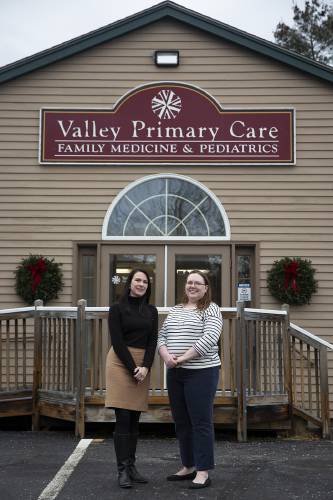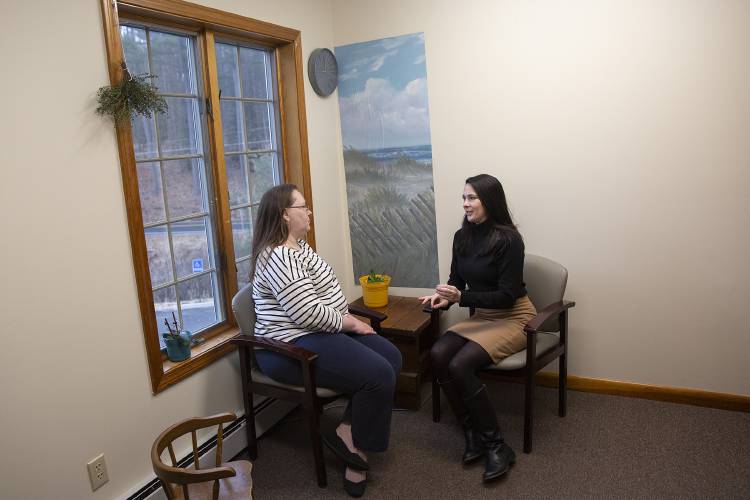Valley Regional program provides primary care for former inmates
|
Published: 01-06-2024 4:24 AM
Modified: 01-09-2024 8:39 AM |
CLAREMONT — Shortly after Jillian Rafter arrived to work as a primary care nurse practitioner at Valley Regional Hospital in the winter of 2022, she noticed that a certain subset of patients was showing up in the examination room.
“They told me they had been incarcerated and it had been a long time” since they had last visited with a doctor or nurse — if ever. Health care, the former inmates told Rafter, had never been a priority in their lives, and many felt defeated in how to “navigate the system.”
“It was overwhelming to them,” Rafter said.
So they skipped getting regular medical treatment in the past. If a health problem arose, the patients told her, they went to the emergency room or an urgent care clinic. Routine medical care was a foreign concept.
When Rafter pressed further to ask why, her patients gave such reasons as it was “hard to get care” or “there was a long wait.” And a couple said bluntly said that they were embarrassed to come in because, she said, they “didn’t want have to talk to somebody about ‘my history of incarceration’ or ‘history of drug use I got my Hepatitis C from.’ ”
Intrigued, Rafter checked with a colleague, social worker Krista LaFont- Leamey, to see if she had noticed a “pattern” among formerly incarcerated individuals who had avoided medical treatment, either out of neglect, shame or simple apprehension about dealing with another bureaucracy asking nosy questions.
“It turns out there was a pattern,” said Rafter, who with LaFont-Leamey, is wrapping up the first year of Valley Regional Hospital’s Post-Sentencing Integrated Care program. The effort brings together the hospital and Sullivan County House of Corrections and aims to assist inmates by creating a plan for them to receive ongoing primary care — something many people take for granted but for the “justice-involved population” can seem out of reach — and from engaging in behaviors that can affect health as well as risk reincarceration.
“We saw this as an opportunity to address a huge gap in care,” Rafter said.
Article continues after...
Yesterday's Most Read Articles
Valley Regional Hospital’s program is now beginning to receive former inmates re-entering the community from Cheshire County jail and the state prisons in Concord and Berlin, and the organizers hope to enlist correctional facilities in Vermont as well. Rafter and LaFont-Leamey say the model has established itself in Claremont, where they are providing about 30 former inmates with ongoing primary health care services.
“We started seeing patients trickling in here from other facilities pretty quickly. The corrections system is so interconnected that once word of this program spread, it expanded pretty quickly without us having to do much to get the word out,” said Rafter.
With funding from the Concord-based Foundation for Healthy Communities and private donors, Valley Regional also has been able to augment its primary health care team, securing funding to hire a second community health navigator, a clinical pharmacist and a registered nurse program manager for substance use disorders and mental health care within the emergency department, LaFont-Leamey said.
“The goal is once they get here, they get the same exact primary care as any other patient in our practices and in the community,” Rafter said, explaining that former inmates re-entering the community have high incidences of chronic — but manageable — health issues such as diabetes, high blood pressure and heart disease. They’re also at higher risk of a gamut of disorders closely associated with incarcerated populations such as HIV, sexually transmitted diseases, alcohol and substance use disorders, depression, anxiety and post-traumatic stress disorder.
As to how the cost for the program is covered, Rafter said “the ongoing New Hampshire Legislature’s protection of expanded Medicaid has actually made this very accessible. Anyone leaving incarceration is Medicaid-eligible.”
Valley Regional Hospital’s program has been embraced by Chuck — he asked to be identified only by his first name — who last year was released from a halfway house in Sullivan County after serving 3½ years in state prison in Concord on an “assault with a weapon” conviction.
Chuck, 67, said he was diagnosed in 2017 with colorectal cancer, for which he received chemotherapy treatment, but has had numerous medical issues since then.
Chuck said he had been discouraged from seeking primary care in the past because he felt his status as an ex-con was like wearing a scarlet letter.
“Coming out of prison, you get profiled. Not by everybody but by some people. That made it difficult to get medication because, of course, (medical professionals) think everybody coming out of prison is a liar,” Chuck said. “You get to the point where you get frustrated because they really don’t seem to want to take you in.”
A couple weeks before he was released from the halfway house, Chuck said his probation officer informed him about the Valley Regional Hospital program and how it would enable him to “get my medical supplies and prescriptions and everything when I get out.”
Since he was released last year, Chuck said he’s had several occasions to utilize Valley Regional Hospital’s program, including treatment for vertigo, “tennis elbow” and a broken rib caused by a fall in the bathroom when the sink he was leaning on snapped off from its wall fixture, causing it to collapse with him falling on top of it.
“Something’s always happening to me,” Chuck said, noting that when it does, he knows he can call Valley Regional to make an appointment.
“The program here — I’m very satisfied with it,” he said.
Rafter and LaFont-Leamey have adjacent offices at Valley Regional and when they began to hatch the idea for such a program in the spring of 2022, they divided up the labor.
LaFont-Leamey researched similar programs to learn what they entailed — she said that although similar programs exist in urban areas she couldn’t find anything like it in rural places — while Rafter began reaching out to correctional facilities themselves.
Luckily, Rafter has a friend on the state drug task force who connected her with contacts in the Sullivan County’s jail probation and parole office: “And the overarching response was pretty great: ‘When can you start this?’ ”
When they came to pitch their idea, Chad Perron, a case manager at the Sullivan County jail, said he and his team liked what they heard.
Perron said that connecting inmates with drug dependency histories who are about to leave jail with a suboxone program has been a routine part of his job. But until the Valley Regional Hospital team came along, the question about what former inmates re-entering the community planned to do about regular health care was not part of the conversation.
“They would get connected with a Medication-Assisted Treatment (MAT) program, but they would not necessarily be seeking a primary care provider who would look after their whole self,” said Perron, who has had nine former inmates sign up with the Valley Regional Hospital program. “Many people in addiction aren’t particularly concerned with medical care. They are wrestling with addiction issues.”
“Now there’s an incentive for them to have both,” he said. “It’s helpful for them to have a medical component along with their MAT support.”
Contact John Lippman at jlippman@vnews.com.




 Homeless Upper Valley couple faces ‘a very tough situation’
Homeless Upper Valley couple faces ‘a very tough situation’ Kenyon: Constitutional rights should trump Dartmouth’s private interests
Kenyon: Constitutional rights should trump Dartmouth’s private interests
